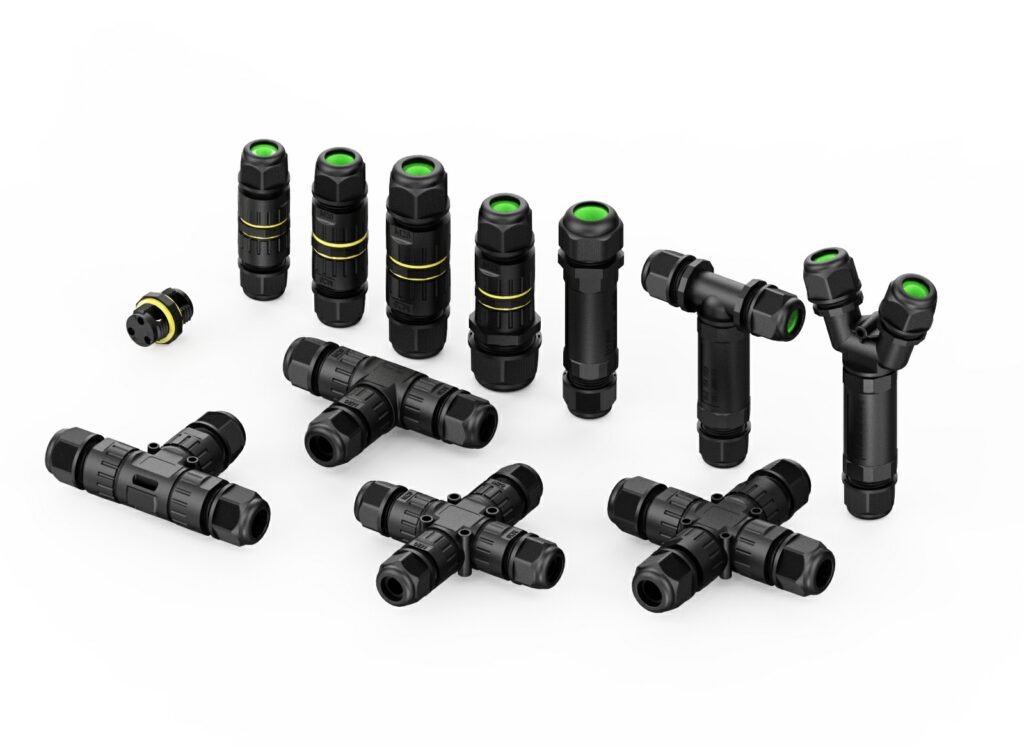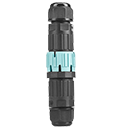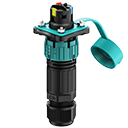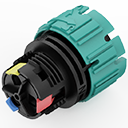Industrial connectors are devices used to join electrical circuits in industrial settings. They are designed to provide a secure and reliable connection between different components, such as cables, sensors, and machines. These connectors are essential for ensuring efficient and safe operation of various industrial equipment and systems.

Industrial connectors are typically made of durable materials, such as metal or plastic, to withstand harsh environments and frequent use. They come in a variety of shapes, sizes, and configurations to accommodate different types of connections and applications. Some connectors are designed for specific functions, such as transmitting high-speed data or power signals, while others are multipurpose and can handle a range of voltages and currents.
In summary, industrial connectors are critical components in industrial automation and electronics, serving as the link between various devices and systems. Their reliability, durability, and versatility make them indispensable in a wide range of industries, from manufacturing and telecommunications to aerospace and renewable energy.
Industrial connectors play a crucial role in various industries by providing a reliable and secure way to connect different components and devices. They are essential for ensuring smooth and efficient operations in industrial settings.
The importance of industrial connectors can be seen in their ability to withstand harsh environments, such as extreme temperatures, shock, and vibration. This durability ensures that the connections remain intact and reliable, even in challenging conditions.
Additionally, industrial connectors are designed to provide high levels of conductivity, which is essential for transmitting signals and power effectively. This helps to prevent signal loss and ensure that devices function properly.
1. Circular connectors:
– Circular connectors are used in applications that require secure and reliable connections.
– They are commonly used in industries such as automotive, aerospace, and military.
2. Rectangular connectors:
– Rectangular connectors are designed for high density applications where multiple connections are required.
– They are often used in industrial automation, telecommunications, and data communications.
3. Coaxial connectors:
– Coaxial connectors are commonly used in RF (radio frequency) applications.
– They are popular in industries such as telecommunications, broadcast, and medical equipment.
4. Fiber optic connectors:
– Fiber optic connectors are used to connect optical fibers for high-speed data transmission.
– They are essential in industries like telecommunications, data centers, and military applications.
5. Modular connectors:
– Modular connectors allow for easy customization and assembly of different types of connections.
– They are commonly used in industries such as computer networking, telecommunications, and industrial automation.
Applications of industrial connectors:
1. Automation industry: Industrial connectors are essential in the automation industry to connect various components such as sensors, actuators, and control systems. They ensure reliable and secure communication between different devices, enabling seamless operation of automated systems.
2. Aerospace industry: In the aerospace industry, industrial connectors play a crucial role in providing electrical and data connections for avionics, communication systems, and other critical components in aircraft. These connectors are designed to withstand harsh environmental conditions, including high temperatures, vibrations, and electromagnetic interference.
3. Telecommunication industry: Industrial connectors are widely used in the telecommunication industry to establish connections between network equipment, servers, and data centers. They facilitate high-speed data transmission and ensure stable communication networks, which are essential for the functioning of modern telecommunication systems.
4. Renewable energy industry: Industrial connectors are utilized in renewable energy systems such as solar panels, wind turbines, and energy storage devices. They enable the efficient transfer of power and data within these systems, contributing to the reliable and sustainable generation of clean energy.











9.jpg)

0 Comments